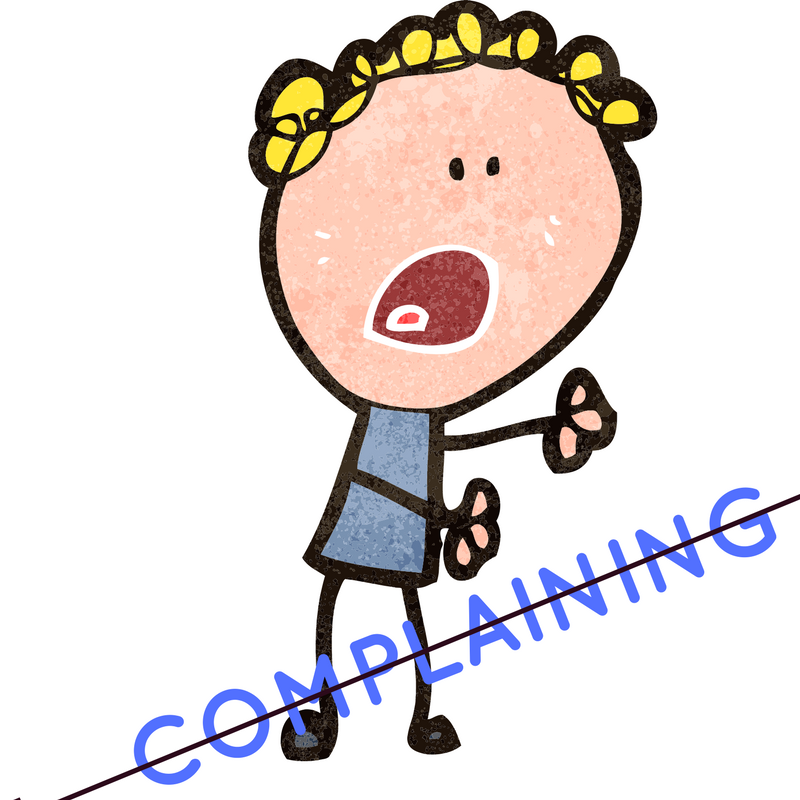 How often do you complain?
How often do you complain?
Whether or not we broadcast our complaints or keep them to ourselves, we are complaining way more than we realize. Complaining is negative.
Just like watching too much TV, or eating too much junk food, complaining is easy to do but not necessarily good for us.
Our brains tend to gravitate towards the negative. It’s like the quote, “We are bothered by the thorns in the rose bush instead of being marveled by the sight of the beautiful roses.”
Complaining increases anxiety and harms your relationships!
Complaining can actually damage your brain. Research from Stanford University has shown that complaining shrinks the hippocampus—an area of the brain that’s critical to problem solving and intelligent thought.
When you complain, your body releases the stress hormone cortisol, which impairs your immune system and makes you more susceptible to high cholesterol, diabetes, heart disease, and obesity. It even makes the brain more vulnerable to strokes.
Second hand complaining is also bad for you so you need to be cautious about spending time with people who complain about everything. Think of it this way: If a person were smoking, would you sit there all afternoon inhaling the second-hand smoke?
You’d distance yourself, and you should do the same with complainers.
Five Ways to Stop Complaining
STEP ONE: CATCH YOURSELF
Sometimes, complaining becomes such a habit that we don’t realize we’re doing it.
Imagine putting a wire tap into your mind so that you can start being more mindful of when you are complaining.
Ask a friend to alert you to each time you complain.
Use a simple rubber band as a bracelet and move it from one wrist to the other when you catch yourself complaining. Attaching this physical action to the process helps you realize how often you’re really doing it.
STEP TWO: IDENTIFY PATTERNS
We all fall into certain patterns. What do you ten to complain about the most?
- Conditions in the world?
- Other people?
- Your spouse?
- Having too much to do?
- How unfair something is?
- Certain person in your life?
- How expensive everything is?
- Your finances?
What is the pattern you fall into? What do you typically complain about?
STEP THREE: HALT FOR FOUR SECONDS
Once you notice when you’re complaining, and you’ve identified your pattern, create some space so you can make a different choice.
When you realize you’re complaining, take a deep breath in, then exhale for four seconds. Then move onto Step Four.
Complaining can be like a run-away train and this helps stop the train.
STEP FOUR: CULTIVATE GRATITUDE
When you feel like complaining, use it as a cue to shift gears and to think about something you’re grateful for. In time, gratitude will become your default setting.
If you find yourself complaining about a person in your life, stop and think about something you appreciate about them.
If you find yourself complaining about politics, stop and find something to appreciate.
Research conducted at the University of California, Davis, found that people who worked daily to cultivate an attitude of gratitude experienced improved mood and energy and substantially decreased their anxiety. (Appreciation reduces the stress hormone by 23%)
STEP FIVE: BE COMPASSIONATE
If you find yourself complaining about the service in a restaurant, stop and think about what kind of day your waiter or waitress may have had or what problems may be going on behind the scenes. If you put yourself in their shoes for a minute, you may be more kind and relaxed about the situation.
Complaining is addictive. The more you do it, even within your own mind, the more it becomes an ingrained habit.
Research shows that three times more positive things than negative things happen to us every day. It’s up to you which one you want to focus on.



Thank you Fay for your blog. You’ve both made a good case and suggested means to help people change their behavior too.
I love this post and it reminds me of something I heard on the radio this morning. The host was talking about how we need to be very careful about the company we keep. And it brought to my mind that people really are contagious! And, as you’ve stated so well, if I hang around a person who is complaining all of the time, chances are I’ll “catch that” and start complaining, too. No can do! I have too much to do to spend time complaining. 🙂